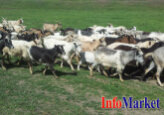
In Moldova, within the framework of the IFAD Programs, in 2024 it is planned to allocate about 210 million lei of financial support for 300 farmers in the country.
As noted in the message of the unit for the implementation of programs of the International Fund for Agricultural Development (IFAD) in Moldova, this was discussed during a meeting of the IFAD Program Supervision Committee, in which the Minister of Agriculture and Food Industry Vladimir Bolea took part. The meeting stated that the Consolidated IFAD Program Implementation Unit (UCIP IFAD) in 2024 will continue to support the agricultural business environment in Moldova through a wide range of financial products and technical assistance. At the same time, through local governments, assistance will be provided to producer groups to build irrigation infrastructure that will improve the resilience of farming communities to increasing climate change. Thus, this year the financial portfolio of UCIP IFAD is about 210 million lei, which will make it possible to provide financial assistance through grants and loans with a grant component to at least 300 agricultural producers. These plans were approved by representatives of Parliament, the Ministry of Agriculture and Food Industry, the Ministry of Finance and civil society, who form part of the IFAD Program Oversight Committee. Vladimir Bolea emphasized the importance of IFAD’s support in the implementation of strategic plans for the development of the agricultural sector in Moldova. “We will continue to support farmers to develop their businesses and make the most of their ideas. In this way, we will create new jobs and contribute to the development of the country. To improve the conditions for doing agricultural business, the Ministry of Agriculture and Food Industry initiated a number of reforms aimed at reducing bureaucratic barriers and reducing administrative burdens. In 2024, we will focus on the segment of initiating and attracting new projects to support farmers in our country. In this context, UCIP IFAD is a successful model for Moldova,” said Vladimir Bolea. UCIP IFAD Director Iurie Ușurelu confirmed the organization’s commitment to developing close partnerships with local authorities and consistently supporting the agricultural business environment in Moldova. “Creating opportunities to launch and develop successful farming businesses is our main goal. We have studied the problems of farmers and will provide real solutions to overcome the challenges associated with climate change resilience through the development of irrigation infrastructure, supporting producer groups to purchase equipment for processing plants, youth and women-led start-ups, etc.,” he stated. Herewith, as noted, through business service providers, at least 500 farmers will receive technical assistance in preparing a package of documents for financing and developing business plans; post-financial assistance (mentoring) through the development of entrepreneurial skills through many tools and individual or group activities and entrepreneurial training. To facilitate access to IFAD's UCIP financial products, the IFAD Program Oversight Committee has amended the Capacity Building Program for Rural Transformation (IFAD VIII) Operational Manual. Meanwhile, under subcomponent 1.1: Increasing resilience to climate change, the area of landowners was increased from 10 hectares to 50 hectares; the requirement for annual financial reporting for enterprises operating for less than 1 year has been eliminated. Potential infrastructure beneficiaries may request the services of an expert (this could be an engineer/specialist from a local authority or district council) with experience in budget development to develop a feasibility study (pre-feasibility stage) (no formal license/certification is required as the data will be updated in the feasibility study paid for by the project). The requirement for at least 4 registered farmer members for infrastructure projects remains the same. For other members, a simple approval from local authorities indicating that these farmers are engaged in agricultural activities will be sufficient. The eligibility criterion will use the new definition of micro and small farmers, taking into account that the project does not support medium and large farmers. At the same time, within the framework of the 2nd component “Financing of Entrepreneurship”, the loan amount limit for small and medium-sized enterprises (production activities) has been increased from 100 thousand to 150 thousand euros, as well as to 100 thousand euros for replenishing working capital. The loan amount limit for microentrepreneurs has been increased from 600 thousand to 1 million lei, including up to 100% for working capital. The loan term for microentrepreneurs increases from 5 years to 8 years, including a grace period from 2 to 4 years. The list of documents required for financing microentrepreneurs has been revised. The role of the IFAD Moldova Consolidated Program Implementation Unit is to mobilize smallholder farmers by providing rural farmers with access to financial services, increasing agricultural sustainability and income. // 17.01.2024 — InfoMarket.







